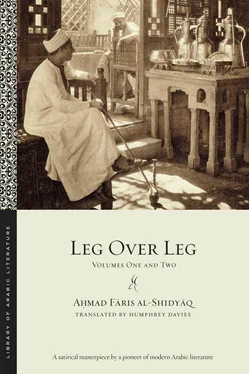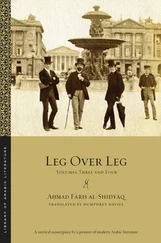2.12.8
On the sixth day, another messenger appeared, and he wrote,
To a eulogist extreme in his praise this day
The prince, they say, gave his shoes away.
Rejoice, ye band of poets, at one so free with both wealth ( yumn )
And pelf ( sunḥ )!
Objection was made that yumn and sunḥ mean the same, to which the response would be that it’s the same as when the poet 516says, “And I find her words to be both falsehood and ballyhooing.”
2.12.9
On the seventh day, another messenger appeared and he wrote,
The prince this day scratched his nether parts
With nails ( aẓāfir ) that had nailed down ( ẓafirat ) his every aspiration,
So everyone either whistled or chanted
Or beat the tambourine or blew the pipes or drummed, in jubilation.
Objection was made that that aẓāfir should not be treated as though it were inflected, to which the response would be that it is not forbidden to treat it as such, especially given that it is followed by the word ẓafirat . 517
2.12.10
On the eighth day, another messenger appeared, and he wrote,
Blessed is he who shaves of a morn
The piebald ( aḥlas ) clean-licked ( malḥūs ) princely pate!
May it remain bordered with God’s grace as long as razor
Can find upon it one noble hair to abbreviate!
Objection was made that “clean-licked” isn’t a quality associated with heads, to which the response would be that it was allowable there for the sake of the paronomasia. 518Then it was claimed that “bordered” in association with “head” was “heavy,” to which the response would be that in the prince’s case the border was quite light. In my opinion, they would have done better to criticize him for writing “Blessed is he who…,” because the phrase is absolute and doesn’t indicate that the prince was shaved on a particular day, though the paronomasia in the second hemistich puts in a good word for the line as a whole.
2.12.11
On the ninth day, another messenger appeared, and he wrote,
Time’s lips parted to reveal a radiant fate,
The day our prince took a bath and was rendered depilate.
His noble nether parts thus appeared less hoary
And poetry, through his pubes, gained in glory.
These two verses were very well received because of the antithesis and the perfect paronomasia and so on that they contain. Except for the words “in glory.” 519
2.12.12
On the tenth day, another messenger appeared, and he wrote,
The prince coughed ( qaḥaba ), and what glorious and gallant gentleman
Of his ilk, among the human race, has never had a cough?
It’s a habit imposed upon all mankind,
And any who hasn’t should be hung on a cross!
Fault was found with the word qaḥaba , to which the response was made that it is a chaste word meaning “he coughed.” 520
2.12.13
On the eleventh day, another messenger appeared, and he wrote,
The prince sneezed, so tears of blood we wept, one and all,
While both globe and celestial sphere recoiled in horror.
God protect his brains from another such sneeze
Lest it so scare the angels that they die of terror!
2.12.14
On the twelfth day, another messenger appeared, and he wrote,
The prince let off a string of silent farts, and what heady odor
Within the universe was spread, what musk unpent!
Would that the limbs of all mankind
Into noses might turn, to inhale that scent!
Fault was found with the word fassā (“let off a string of silent farts”), since the repetitive form 521has no meaning here, to which the response would be that even what is little becomes much when attributed to a prince; a similar logic applies to the words ẓallām li-l-ʿabīd (“a (repeated) oppressor of mankind”), 522since the least degree of outrage ( ẓulm ) against what is due to the Almighty Creator in terms of the ruler’s dealing justly with His creation is too much.
2.12.15
On the thirteenth day, two messengers appeared, and he wrote,
The prince at mid-morn this day let off an audible fart,
The sky being dark, no hint of sun revealed,
And all parts of our land with its perfume were scented
For t’was a fart ( ḥabq ) that the scent of basil ( ḥabaq ) concealed.
These lines were well received because of the paronomasia that they contained.
2.12.16
On the fourteenth day, two other messengers appeared, and he wrote,
The prince’s bowels this day were loosened ( ushila ) and as one
Did all rejoice, for his looseness ( ishālihi ) brought him ease ( tashīl ).
They purchased some silk-wool for him, embroidered,
And rushed to claim that constipation’s a fatal disease.
The first verse was well received because of the paronomasia but fault was found with “embroidered” because there’s no call for embroidery in this context, indeed, it would cause pain; to which the response was that it follows the original and a good translation neither adds to nor subtracts from the original from which it is taken, especially where important and significant matters are involved. Fault should have been found with the words “as one did all rejoice” (albeit he does go on to explain what he means, by saying “for his looseness brought him ease”), for the hearer’s natural first reaction is that the looseness of the bowels will lead to the death of the object of the panegyric; the paronomasia, however, may be considered to draw a veil over this solecism.
2.12.17
With this redolent episode behind him, the Fāriyāq decided it was his duty to visit his friend and let him know how things had gone. After he had been honorably received and seated in the man’s salon, the Khawājā asked how he was, to which the Fāriyāq replied, “I would have wished, sir, to visit you sooner but was afraid that some trace of the smell that was all over me would fill this gathering of yours.” “It would have done no harm,” the other returned, “for I am used to it, and not a day goes by in this salon without similar smells filling it from the visits of the Prince and his like, which is an insalubrious calamity. But how are you doing in your everyday life?” “I’ve rented a small place,” said the Fāriyāq, “bought a donkey, acquired a maid to take care of the first, hired a manservant to take care of the second, and am now, thanks to your patronage and bounty, doing very well.” Then he left him, calling down blessings upon his head.
2.12.18
(A Secret between Me and the Reader)
The doctor on the island advised the Fāriyāq to set women to one side — meaning to keep his distance from them, not stick to their sides — for proximity to them would be his undoing . He dismissed his words as “both falsehood and ballyhooing .” 523
CHAPTER 13: A MAQĀMAH TO MAKE YOU SIT
2.13.1
I shall not sleep well tonight unless I compose a maqāmah first. I have made it the custom of my pen at this point 524to do nothing but rhyme , producing elegant periods that charm the mind and are appetizing and pleasing to the ear. I thus declare:
2.13.2
Faid al-Hāwif ibn Hifām in lifping tones, “Once, as I walked through Cairo’s markets, my eyes o’er their attractions wandering aglaze , the beauty of their sideways-glancing girls absorbing my gaze , overtaken by camels from its every zone , so that now I was against this wall crushed, now at the foot of that one thrown , at one moment placing my hand over my eye, at another over something that might smaller or larger be, a young man signaled to me from a store he seemed to own —a youth bearing every sign of prestige and high-standing — with an agitation that pierced one’s chest and settled there to rest .
Читать дальше












